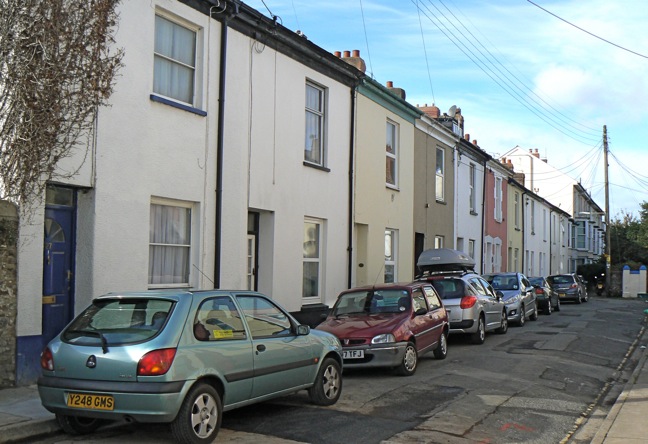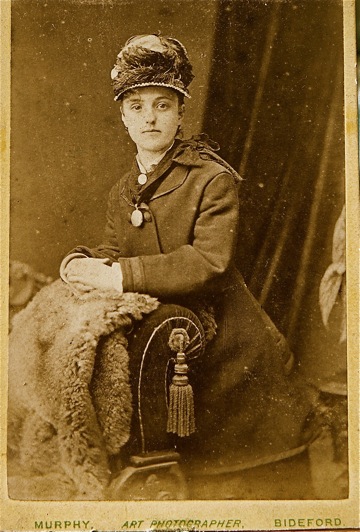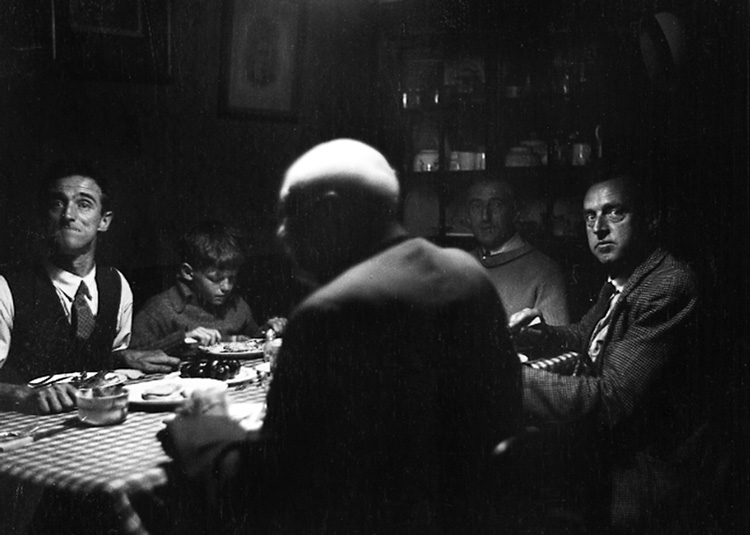The 1871 census shows that the Prance family
at Peppercombe is quite extensive. John and Mary are living with
their widowed daughter Athalia in the 'rude cotage by the sea',
below the Castle, but during the Autumn John inadvertantly fell
over the cliff and later died from his injuries. He was
buried in Parkham churchyard on 2nd. October 1871 aged 82.
William and Harriet and their family of six children must have
occupied one of the other cottages. All male adults are
described as fishermen except William who was a Master Mariner,
a title which probably entitlesd him to captain a substantial
vessel. Joseph, one of John's sons, is living at the
Castle with his family. ( Joseph evidentally had a club foot but
distinguished himself by saving a man's life off Peppercombe.
Ref: Bideford Gazette. 17/12/1861 ) The Castle incidentally was
the property of the Pine Coffin family. Also at this time,
1871, we find Deera Hollway aged ten living with her parents
Henry and Mary Hollway and siblings at 1 Albert Place, Old Town,
Bideford.
1881. William and Harriet have now
brought their family from Peppercombe into Bideford and are
occupying the house 26 Milton Place, Old Town.. Frederick
obviously had his eye on the rather serious looking Deera, a few
doors away at 1 Albert Place, because in 1891 we find him
married to her and living at 2 Albert place with the first of
their five sons Frederick. (Today Albert Place consists of one
dwelling only)
In 1901 we next find Frederick and Deera, now
with five sons living at 30 Old Town, two doors away from 1
Albert Place together with Deera's father Henry now aged
79. Frederick is here described as master of his own
fishing trawler so the family by this time must have had some
finanial independance. in the meantime William and Harriet are
probably still living at 26 Milton Place.
In 1911 Frederick and Deera are found at 66
High Street with all their family including Harriet now a widow
of 84. At a date soon after this the family moved into 91
Abbotsham Road which became the family home until Deera died in
1952. All the above mentioned Bideford houses are still there.
No 30 Old Town still bears the name DERENDA, a word easily
identified with the name Deera. There is nothing left of the
Castle at Peppercombe.
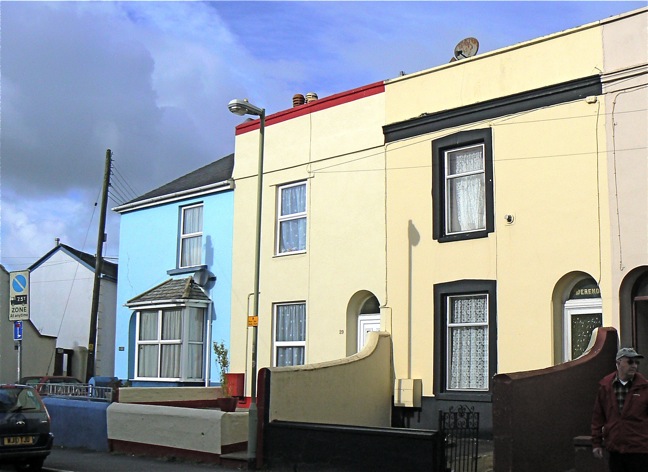
Milton Place 1 Albert
Place
DERENDA
30 Old Town
|
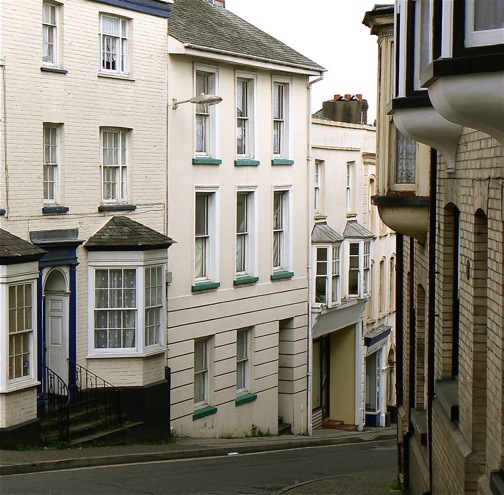
66 High Street (centre)
|
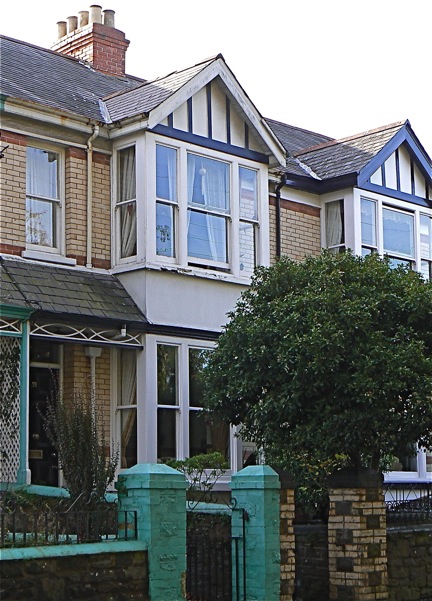
Glendale. 91 Abbotsham Road. ( Now 'The
Hollies')
DEERA LOCKE
HOLLWAY Aged sixteen
I feel that Deera has not had the recognition
she deserves. She brought five sons to maturity, one of
them seriously handicapped whom she cared for all her life and
also looked after a much debilitated husband in his last
years. I remember her with affection and great respect.
She feels particularly close as the houses she lived in are
within a few hundred yards of where we live now.
GLENDALE, 91 ABBOTSHAM ROAD, BIDEFORD
...........A few memories from the times that I spent
during holidays in Bideford just before the war at my
grandparent’s house in Abbotsham Road and at the end of the war
when difficulties in London and my father’s lack of work forced
my parents to stay at father's former home for a while.
My father usually arranged a visit or a
holiday in Bideford at least once a year to see his parents and
Claude, his disabled brother who lived with them, and other
members of the Prance family who still lived nearby. We were
fortunate to have a car and father always set off at what seemed
the crack of dawn competing with himself to make the journey in
record time. I was too young to remember much of the journeys
but the house and its occupants made a great impression.
The house itself was a conventional L shaped terrace
house. The parlour, which was kept for ‘Best’, off
the hall was just inside the front door, another room which was
Claude's, next the dining room which led into the kitchen.
Outside was the small garden, an outside lavatory, a shed
or workshop and small garden area. It was inside the house and
the people in it however that were the most memorable.
Until my grandfather’s death in 1939 the
house was occupied by him, his wife Deera, Claude who I have
said was disabled and a lodger by the name of Mr. Barfett whom I
assume was there to help with the household budget.
Grandfather, with his bald shiny head, had once been a
tall strong man, a powerful swimmer who had saved many lives in
Bideford Bay but at this age suffered terribly from asthma. This
was so debilitating that he was unable to walk from one
end of the house to the other without gasping and having to
light some powder from a tin, burning it and inhaling the
smoke. Therefore on entering the house one was first
struck by the burnt leafy smell which was always present.
During his life he had been known as Captain Prance, master of
his own sailing fishing trawler based on the quay at Bideford.
Having lived a healthy life outdoors I often speculated on the
cause of his Asthma since none of his five sons or their
families had suffered similarly. In the 1930’s he was able
to make the journey to Sussex to visit us but his little tin was
never far from him. I cannot recall his voice now but
remember him with affection.
Grandma was a character and uncompromising in
her rules. She managed the house. Her accent was broad
‘devonshire’ and I can still recall her voice today. A
slight woman with a straight back, busy and unsmiling, usually
to be found in the kitchen or sewing in the dining room.
She never seemed to be without an apron on and it was a family
joke that she kept putting one apron on top of another to keep
the one underneath clean until she had quite a layer. She
must have had a hard life bringing up five sons, a husband now
suffering from very bad health and a lodger to look after.
As I will now relate one of her sons was of great concern
and obviously continued to be a great worry .
Claude had a large pit in the top of his
head, the result of a terrible accident when he fell out of his
pram when still a baby. This left him with un-coordinated
movement in his limbs and a speech defect so bad that only those
who knew him well, his family or those who befriended him in the
town could understand what he was saying. This was not
only frustrating to those he met but also to him personally and
resulted in many a scene and bad temper. Because of his physical
difficulties he was untidy in his dress and often
unshaven. He was obviously unemployable but when his father was
working his fishing vessel he would go down to the quay, help
his father and was well known and befriended by other fishermen
and townspeople on the quay so he was known to quite a
few. This paints a rather depressing picture of Claude but
like many others with a disability he had extraordinary gifts.
For a start he was talented as an artist as
testified by his many paintings. But that shed in the back
garden was his retreat and his heaven. In it was a complete
jumble of what appeared to be workshop rubbish. Old tins, tools,
nuts, bolts and discarded remains of many a job lot.
Claude was however a craftsman and from all this apparent
rubbish he bent, hammered together, soldered and fashioned all
sorts of ornaments and machines. The most remarkable were
his wind working machines. He designed models of men and
animals all propelled into action by the wind. These
were fastened to the tops of poles so that when the wind blew
the clatter of these working models filled the air in the small
garden behind the house. Extremely ingenious..... and
considering the clumsiness he had to contend with quite
remarkable, Being the son of a sailor and
fisherman he was fascinated with ships and fashioned
in wood many models of ships all painted and delicately rigged.
One of these I still have. Such were Claude’s
interests and abilities. Indoors he frequently
played his wind up gramophone and the house resounded to the
songs of Richard Tauber and the like.
When Grandma died in 1952 something had
to be arranged for Claude. The remaining brothers sold the
house and with the income generated he was accepted into the
Western Counties Home at Starcross where he lived until his
death in 1980 at the age of 83! He was, according to
the staff and those who visited him there, very happy. He
was popular and very much at home in the workshop and continued
to paint and a number of his paintings were made into Christmas
cards which were published.
The other member of the household was
Mr.Barfett. I remember Mr.Barfett for two things. He was a
mathematical genius and also an epileptic subject to fits.
Genius is perhaps too strong a definition but he had the ability
to answer instantaneously almost any complex
mathematical problem you could think of. Being a small boy
I was unable to test this out properly but was assured by
everyone that he had an astonishing brain that in a flash could
solve seemingly impossible sums. I assume he was employed
and used this talent in his work unless of course his epilepsy
prevented him from working. I witnessed one of these fits
in the dining room at Glendale and watched with awe as he
stiffened up and slid from the chair onto the floor. It didn’t
last long but the whole thing was the sort of experience that a
young child finds quite baffling but at the same time takes in
his stride as matter of fact.
A frequent callers at the house were my
uncle Clarence and his wife Ethel who lived at Tower House in
‘The Strand’. He was the one brother of the five who
lacked worldly ambition and I believe had communistic
leanings. He had a philosophical turn of mind, was an
atheist, was well read and was the sort of person whom you might
expect to turn up at a political meeting and become
argumentative. He and Ethel had no children of their own
but 'Clarrie' always had something unusual to entertain me with.
He arrived with all sorts of tricks. He made paper burn in
such a way that it portrayed a picture or made indoor
fireworks. I think he nade more of a fuss of his dog than
his wife as they were inseperable and went everywhere
together. He certainly doted on ‘Bat’ having taught him all
sorts of tricks which he proudly demonstrated at every
opportunity. Although something of a maverick I liked
Uncle Clarrie. He owned a plot of land in Bay View Road
overlooking The Burroughs where there was a shed for shelter and
for making cups of tea etc. After the war he kept his three
wheeled Morgan car in the shed and as a family we used to spend
afternoons up there looking through his telescope at ships and
people walking on the golf course. He told the story that during
the war while looking through his telescope at The Burroughshe
he saw someone blown up by a mine. It is an unlikely
story but the sort of thing that happened to Uncle Clarrie.
.
At the very end of the war we stayed at
Glendale for three months or so before returning to our
house in Hampstead. That was the last time I was there.
Only Grandma and Claude lived there then. Mr.Barfett was either
dead or had moved elsewhere. I attended the art school
which I thoroughly enjoyed. Once I borrowed a canoe which Uncle
Clarrie had constructed from sheet metal and in it I set off up
the river taking advantage of the tide and using it to bring me
back home again. On another occasion I used it to ‘stick’ dabs
on the sandy bottom of the river at low tide. I had the
misfortune of choosing a Sunday for one of these expeditions and
arrived home dishevelled and obviously looking worse for wear.
Grandma opened the front door and I can recall to this day the
indignity and disgrace she felt at such a spectacle entering her
house on the Lord’s day. I believe my parents suffered for
my indiscretion.
Grandma kept her straight back to the very
end and when she was about to die at the age of 91 she is
reputed to have sat up in bed and said “call the
brothers”. She waited until they had all dutifully arrived
from different parts of the country before dying peacefully in
her bed.
Christopher Prance
Uncle Claude, myself, Grandpa,
my father Bertram, Uncle Clarence
About 1938 at 91 Abbotsham Road


